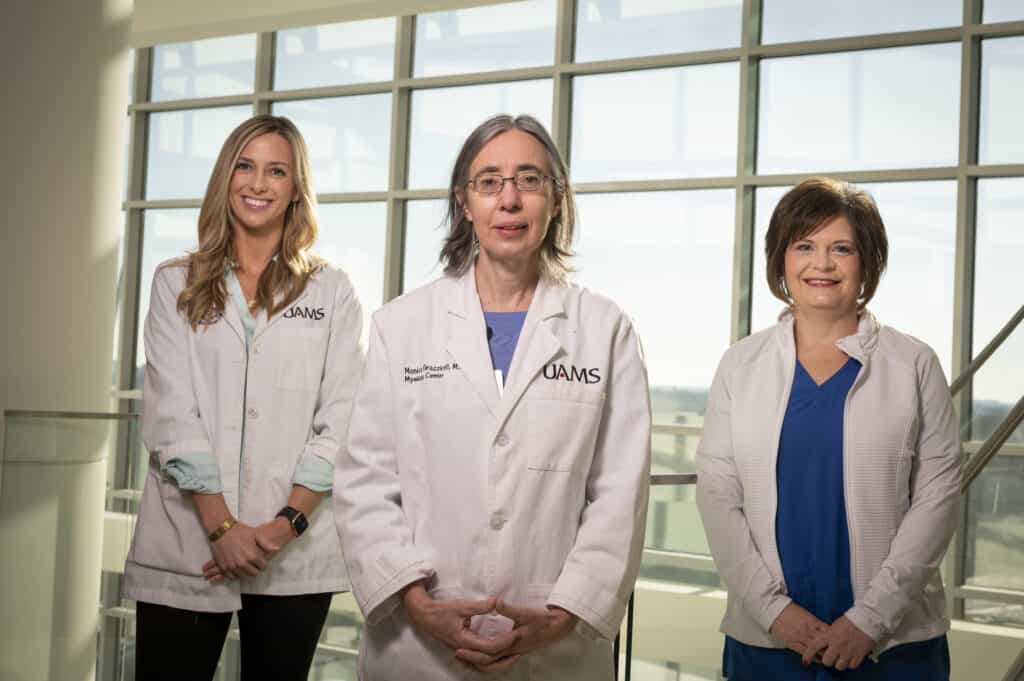
For more than 30 years, the staff of the Myeloma Center at the University of Arkansas for Medical Sciences (UAMS) Winthrop P. Rockefeller Cancer Institute has been treating and healing patients with superior care. When COVID-19 arrived in Arkansas in March 2020, that care continued without missing a beat.
Laryn Phillips, RN, a nurse with the Cancer Institute’s Infusion Center B, said the most difficult aspect of the pandemic has been the fear of the unknown, the unrest of the entire world and being stretched thin, physically and emotionally.
“Most folks had never experienced a pandemic,” Phillips said. “It’s the not knowing how to deal with such a crisis or storm that doesn’t seem to stop raging and isn’t over yet.”
The Myeloma Center staff working in the Infusion Center B were warned of possible shortages of sterile gloves, saline and dressings.
“We all had to think outside of the box because our routines were challenged,” said Monica Grazziutti, M.D., physician director of Infusion Center B and a hospitalist with the Myeloma Center. Those challenges included substituting digital meetings for in-person ones.
“When it came to COVID, we had to learn from our patients, who I’ve watched adapt and overcome obstacles for years,” said Nicole Vaden, APRN, a nurse practitioner who works with Frits van Rhee, M.D., Ph.D., clinical director of the Myeloma Center. “A diagnosis of myeloma stops them in their tracks and dramatically changes things, just like the pandemic did for us. But myeloma wasn’t stopping our patients, so COVID wasn’t going to stop us from taking care of them.”
“Teamwork and communication have improved, and we have learned to adapt to whatever obstacles we might face, so we can provide the best care for our patients,” she said.
Vaden said she and her colleagues didn’t experience a shortage of supplies or medications but did need to take care to ensure that there were beds available in the hospital for myeloma patients when they were needed.
“Myeloma didn’t stop because of COVID, and about 500 patients have had stem cell transplants since its arrival in Arkansas in March 2020,” she said.
The most difficult period of the pandemic was in the beginning when visitors, including caregivers, were not allowed in inpatient or outpatient areas, said Grazziutti. Exceptions were made to allow caregivers to accompany some patients with special needs.
During this time, nurses in Infusion B went the extra mile, sitting in cars with caregivers as they waited for loved ones.
“They listened and let them cry on their shoulders,” Phillips said.
Oncologists at the Myeloma Center never stopped prescribing treatments; however, some were postponed when the risk of exposure outweighed the advantages of treatment. Some patients also declined to come for treatment because of pandemic concerns.
Patients confirmed or suspected of having COVID were isolated to prevent the possible spread to others.
“Initially, it took about a week to get COVID test results,” Grazziutti said. “Then we were able to get them back within hours, which made our work much easier.”
Individual educational meetings with patients over the phone replaced traditional group gatherings. Masking, which UAMS still requires, frequent handwashing and social distancing also helped keep patients safe.
“This pandemic proved that doing those things prevents all respiratory infections,” Grazziutti said. “We had the first winter without flu or other respiratory infections.”
The staff also encouraged patients to get the vaccine once it became available.
“We truly care about our patients and want to do everything possible to give them the best care,” said Vaden.
Myeloma Drugs Pivot to also Treat COVID Patients
Two drugs that Myeloma Center oncologists prescribe to treat myeloma or Castleman Disease also benefit COVID-19 patients.
Dexamethasone, a corticosteroid commonly used to treat myeloma patients, showed benefit for COVID patients who had difficulty breathing. “This drug was also previously used for patients with other viral respiratory infections with low oxygenation,” said Monica Grazziutti, M.D.
Tocilizumab, a medication that Myeloma Center patients with Castleman Disease receive in the Infusion B clinic, is also used to treat hospitalized COVID patients with severe inflammation and /or hypoxemia who aren’t responding to dexamethasone, Grazziutti said.
.
